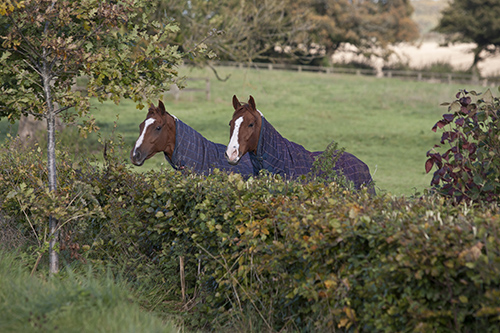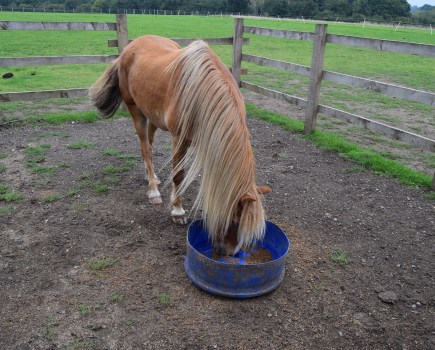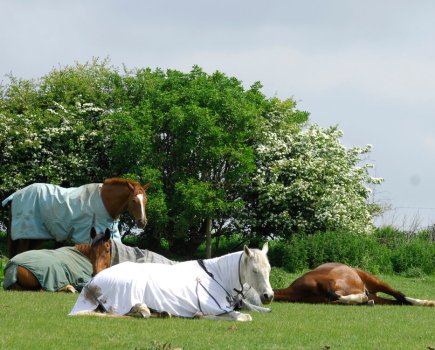Feeding herbs to horses as part of their diet can have huge benefits for their overall health and wellbeing. Thousands of years ago, wild horses would have had unlimited access to hundreds of different medicinal plants, allowing them the opportunity to self-select the plants they needed. This isn’t possible in the modern-day horse, but by understanding the health benefits of various berries, barks, leaves, roots and flowers, and offering plant medicine in the form of essential oils, herbs, powders and extracts, you can give your horse a chance to use their innate self-medicating skills.
There are a wide range of medicinal plants that can promote healing, reduce pain and inflammation, ease gastrointestinal discomfort, combat toxicity, ease stress and boost your horse’s immunity and overall wellbeing. They can be used to enhance wellness, maintain health and complement conventional vet treatment to aid recovery.
Herbs, essential oils and plant extracts can be offered to your horse for inhalation or for them to lick from your hand. They can even be applied topically to assist in wound healing, or to reduce swelling or itching.
Working with nature’s pharmacy by feeding herbs to horses also opens up a line of communication between the two of you. Your horse will be able to ‘tell’ you which medicines they need and you’ll be able to understand more about how they are feeling, both emotionally and physically.
Feeding herbs to horses
The length of time your horse may need a remedy will vary depending on the nature of the problem. To get the best results, and to use plant remedies safely, you should always consult a qualified practitioner who will be able to help you identify the most effective remedies for your horse’s specific needs. Generally, the remedies I recommend should be offered daily.
Some popular equine remedies include:
- Peppermint for digestive complaints.
- Dandelion, nettle and cleavers to detoxify and cleanse.
- Red clover to help balance hormones.
Allow your horse to inhale the essential oil or lick the herb from your hand. Encourage them to choose the ones they want and to control their own dosage. A horse’s needs may vary greatly from day to day, so don’t be tempted to add anything straight to their feed bucket. It’s always better to let the horse lead the way as they will know exactly what they require at that time.
Many herbs, such as rosehip and nettle, can be picked from the hedgerows at certain times of the year. To buy dried herbs or plant oils, choose a reputable supplier. To ensure the highest medicinal value, plant remedies must be organic, well produced and carefully stored. For essential oils try shechina.co.uk, and for herbs look at organicherbtrading.com.
Feeding herbs for napping and anxiety
Sometimes an owner will come to me and say their horse has a habit of napping, or they’ve become nervous under saddle after a break from work or change in routine. In this situation, my aim would be to boost the horse’s confidence and self-belief and help them to face the world with a more positive approach.
I would also spend some time working on the ground with the horse. Take them for short walks and introduce little challenges in a safe environment — you could even employ the help of their field companion so they feel safer. Praise every positive step the horse takes, and be quiet, confident and calm.
Practise stroking the horse slowly from head to toe before your groundwork sessions. Stroke down each leg and press your hands firmly around the hoof for 10 seconds — this will help him to feel more connected to his feet and a little safer.
Soothing essential oils to try include:
- Neroli, which is deeply relaxing.
- Rose Otto, which can relieve past trauma, fear and anxiety.
- Frankincense, which induces slow, deep breathing, helping to eliminate anxiety.
Anti-inflammatory herbs for arthritis
Certain herbs are believed to have an anti-inflammatory effect, which is ideal if you have an older horse suffering with arthritis. Liquorice root, turmeric, devil’s claw and cleavers are useful herbs to offer, and your horse will likely only choose one or two of these.
I would also recommend offering barley grass powder daily. It’s highly alkaline and will help to reduce acidity within the horse’s body. This is very helpful when easing the symptoms and progression of arthritis in both people and animals. Other remedies are German chamomile and peppermint essential oils for their analgesic and anti- inflammatory effects, rosehip extract and nettle herbs for their cleansing and detoxifying effects.
Also known as Urtica dioica, nettle is great for boosting blood circulation, respiratory health and metabolism. It has an amazing nutrient profile and in years gone by was fed as a matter of course to keep horses healthy. It contains essential vitamins and minerals and is low in salt. Chlorophyll, a potent superfood, is also found in nettle leaf.
Nettle’s primary use is as a tonic, stimulating circulation and cleansing the blood. But its profile is wide reaching, including helping with osteoarthritis, metabolic issues, skin health, the respiratory system, pain and allergies. Fed along with dandelion, it can tackle the urinary system too. Horses love nettle leaf and it isn’t difficult to feed – they don’t need much to get the benefits. You’ll see it all around, so take a strimmer to it, or pick it by hand wearing gloves. Just make sure you only pick herbs that haven’t been sprayed with anything toxic.
If your horse lives out, you could put nettles in the field once it’s dried and they may choose to tuck in. Alternatively, hang some nettle leaf in a haynet until it’s dried and then feed in the stable. As always, make changes and introduce new herbs to your horse’s diet gradually. If you are targeting a particular health issue, consult your vet for advice first.
Love hacking? Join our free #Hack1000Miles challenge and see how far you can go!
Subscribe to Your Horse Magazine – the perfect Christmas gift!









